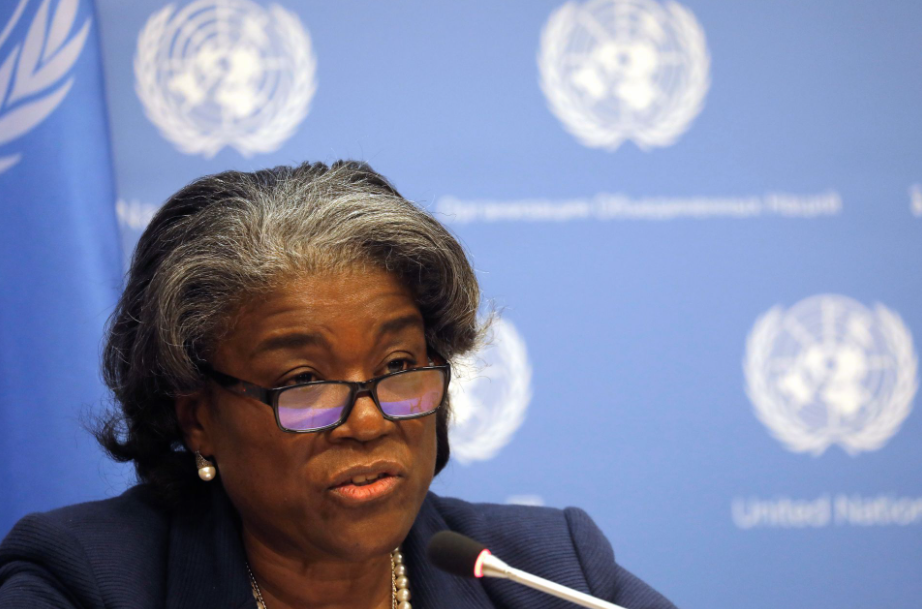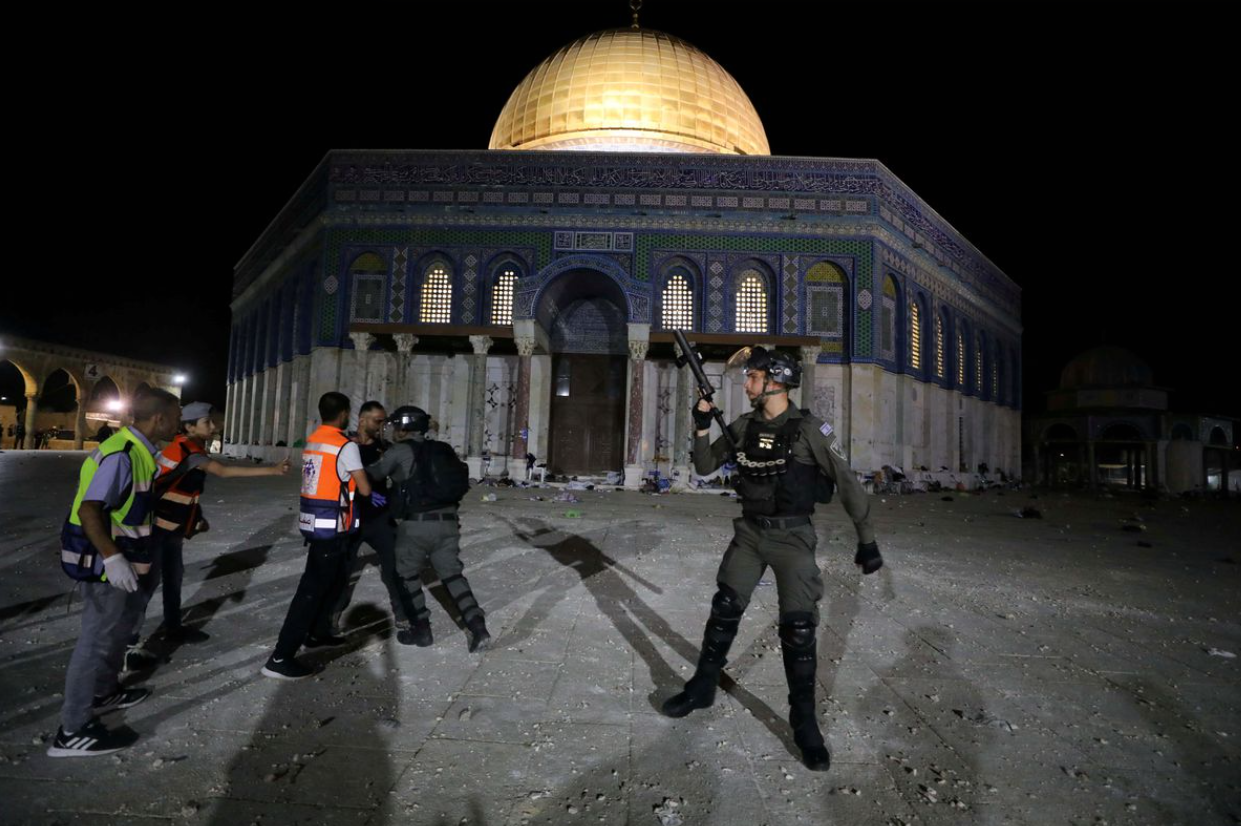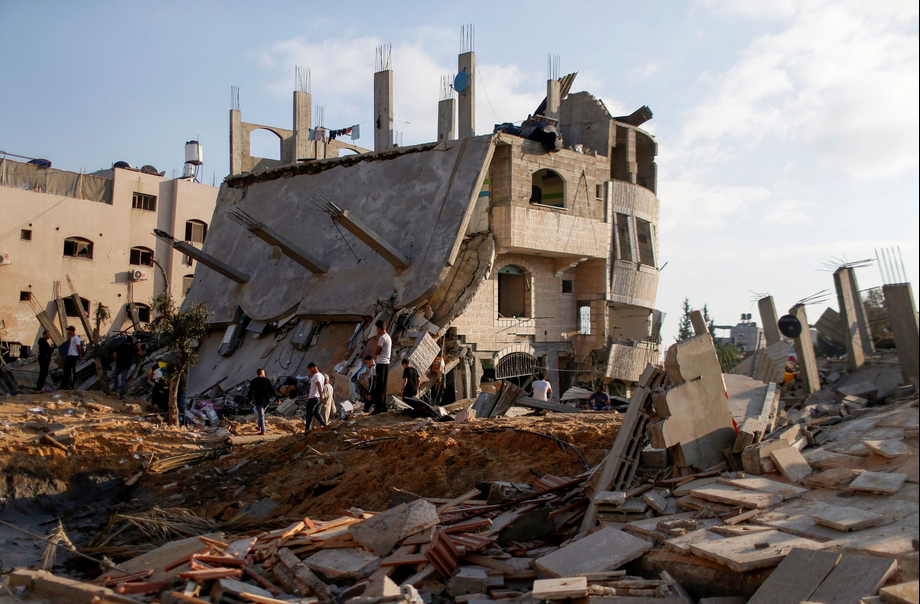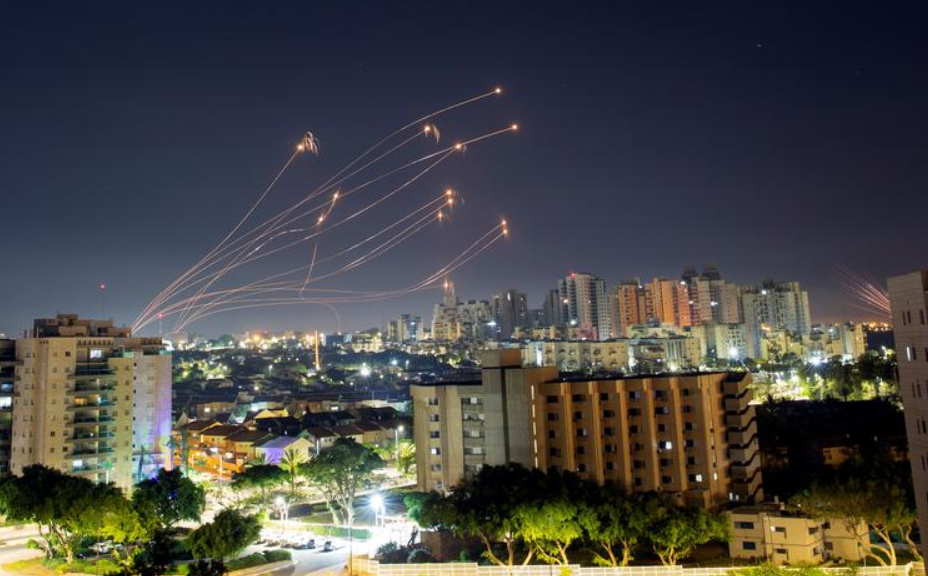When fighting between Israel and the Palestinian Islamist group Hamas entered the seventh day on Sunday, the UN Security Council convened to discuss the ongoing situation.
In a show of support for Israel, the U.S. has emphasized that diplomatic efforts should come first before a joint resolution. It had also tried to block the meeting from taking place. This, however, does not necessarily signal the Biden administration's unconditional support for Israel.
Unlike Israel's settlement construction in the occupied West Bank, an ongoing activity largely opposed by progressive Democrats, in the case of Israel's dealings with Hamas, past U.S. administrations have persistently defended its right to launch retaliatory airstrikes on Hamas-ruled Gaza, even though the civilian toll in the Palestinian territory kept rising.

U.S. Ambassador to the United Nations, Linda Thomas-Greenfield holds a news conference to mark the start of the U.S. presidency of the U.N. Security Council for March, at U.N. headquarters in New York, U.S., March 1, 2021. /Reuters
U.S. Ambassador to the United Nations, Linda Thomas-Greenfield holds a news conference to mark the start of the U.S. presidency of the U.N. Security Council for March, at U.N. headquarters in New York, U.S., March 1, 2021. /Reuters
"The U.S. is familiar with Hamas' game of using civilians as a human shield protecting its leaders and rocket units. The same tactic was used against the U.S. by Saddam Husayn and ISIL," said Meir Litvak, chair of the Department of Middle Eastern and African History at Tel Aviv University.
Experts believe the U.S. has the ability to at least provide a fertile ground for ceasefire talks, but a UN intervention is unlikely without Washington onboard.
Had a UN joint resolution been agreed upon, it would have helped Hamas and harm Netanyahu's efforts, Litvak told CGTN.
The gains and losses
The tit-for-tat rocket assaults between Israel and Hamas have been a frequent scene hassling the two sides after Israel withdrew its occupying forces from Gaza and imposed in 2007 an indefinite blockade that has since made life miserable for the Palestinians living there. The fighting this time is the worst in both scales and casualties since 2014, when Israel launched a ground offensive deep into Hamas' stronghold and thousands, the vast majority of which were Gaza residents, died during the weeks-long conflict.
Relative calm between the two sides has been achieved in recent years, especially after the COVID-19 pandemic swept across the world. But a series of incidents in Jerusalem since the start of Ramadan have fractured the tenuous peace. As days of Israel's escalating clashes between Palestinians and Israeli police broke out in the Temple Mount, or the Al-Aqsa Mosque compound, a holy site revered by both Muslims and Jews, Hamas made an ultimatum demanding the removal of Israeli police there. When ignored, the militant group launched rockets into central Israeli cities and districts that Hamas arsenal had seldom reached.

An Israeli policeman scuffles with a Palestinian in front of the Dome of the Rock during clashes at a compound known to Muslims as Noble Sanctuary and to Jews as Temple Mount, amid tension over the possible eviction of several Palestinian families from homes on land claimed by Jewish settlers in the Sheikh Jarrah neighborhood, in Jerusalem's Old City, May 7, 2021. /Reuters
An Israeli policeman scuffles with a Palestinian in front of the Dome of the Rock during clashes at a compound known to Muslims as Noble Sanctuary and to Jews as Temple Mount, amid tension over the possible eviction of several Palestinian families from homes on land claimed by Jewish settlers in the Sheikh Jarrah neighborhood, in Jerusalem's Old City, May 7, 2021. /Reuters
The move, which invited Israel's harsh retaliations, is regarded as a means to pursue major strategic gains. "Hamas wants to capitalize on the situation to establish itself as the undisputed leader of the Palestinian issue," Litvak said.
For years, the group that builds its platform on Islamist beliefs has had limited success in attracting the support of Palestinians living elsewhere. But recent events in Jerusalem have presented an opportunity for Hamas to expand its support base, as they touch upon subjects central to the Palestinian struggle.
"Hamas seeks political gains vis-à-vis Israel in Jerusalem, and they can claim success in igniting a major rift between Arab and Jewish Israelis," Litvak said.
But now that Hamas has made its political gains, a ceasefire with Israel has become desirable because it does not want to lose more assets, assets that are likely to be destroyed by Israel's precision strikes, Litvak added.
Over the last week, Hamas officials have signaled its readiness for a halt in hostilities. Israel, on the other hand, is in no rush to pull itself out of the fast-deteriorating turmoil. For a country faced with constant threats from outside forces that see its destruction as the ultimate aim, Israel seems bent on continuing the fight in order to achieve long-term deterrence.
"This means overall deterrence is determined not only by the combination of high costs and low returns for Hamas, but of how the current situation cements the understating that trying to challenge Israel with violence against its citizens will only yield misery to the attacker," said Yochai Guiski, a retired Lieutenant colonel from the Israeli Defense Forces and Ministry of Defense and a strategic advisor and researcher focusing on international affairs and strategic planning.
In a statement Sunday, Netanyahu said Israel has international backing, and its Gaza campaign "will take time." The same day also saw Israel's deadliest bombardment in Gaza in the past week, which has cast a dark shadow over the prospect of a return to peace.

Palestinians gather around the ruins of buildings which were destroyed in Israeli air strikes amid a flare-up of Israeli-Palestinian violence, in the northern Gaza Strip, May 13, 2021. /Reuters
Palestinians gather around the ruins of buildings which were destroyed in Israeli air strikes amid a flare-up of Israeli-Palestinian violence, in the northern Gaza Strip, May 13, 2021. /Reuters
Whether the fighting will end in the foreseeable future is likely to rest on how foreign mediation proceeds. But even if a UN joint resolution was issued, it would have little effect by itself, Guiski said. "Nevertheless, If the statement would be a part of quiet understanding brokered by Egypt or other credible mediators, it could be used by both sides as an excuse to end the violence."
Egypt and Qatar, which are both in direct contact with Hamas, have been instrumental in brokering previous ceasefire agreements between Israel and Hamas.
"If Israel sees that Hamas is not netting achievements, the cost to Hamas has been high enough, and that Israel has a reasonable way to cease the hostilities, it will take it," he added.
So far, mediation offers by Egypt and Qatar have been firmly refused by the Israeli government, while the U.S. has shown reluctance to direct the mediation efforts, which analysts believe will only embolden Israel.
Yet Washington's position may shift as the fighting escalates. "It will not defend an unlimited Israeli war, and is likely to exert pressure on Israel to end its practices in Jerusalem and the West Bank," Litvak said.

Rockets are seen launched from the Gaza Strip towards the Israel, May 11, 2021. /Reuters
Rockets are seen launched from the Gaza Strip towards the Israel, May 11, 2021. /Reuters
The tacit understanding
In recent years, the Israeli government and Hamas have grown accustomed to a tacit understanding – some form of coexistence – even though neither side officially acknowledges it.
Israel and Hamas got along not because Hamas became pragmatic and disillusioned with its religious and nationalistic vision of destroying Israel, nor Israel has become a peacenik state which acquiesces to its enemies, but because Israel is not interested in ruling Gaza, and Hamas has employed different methods to coerce Israel, said Guiski.
"As long as it is still politically convenient and strategically sound to the current Israeli leadership to maintain this arrangement, it will continue. The same also applies to Hamas," he added.

